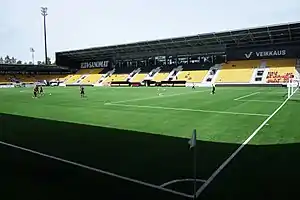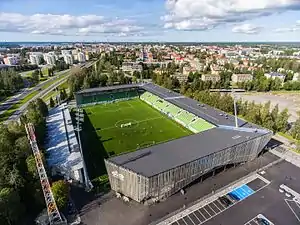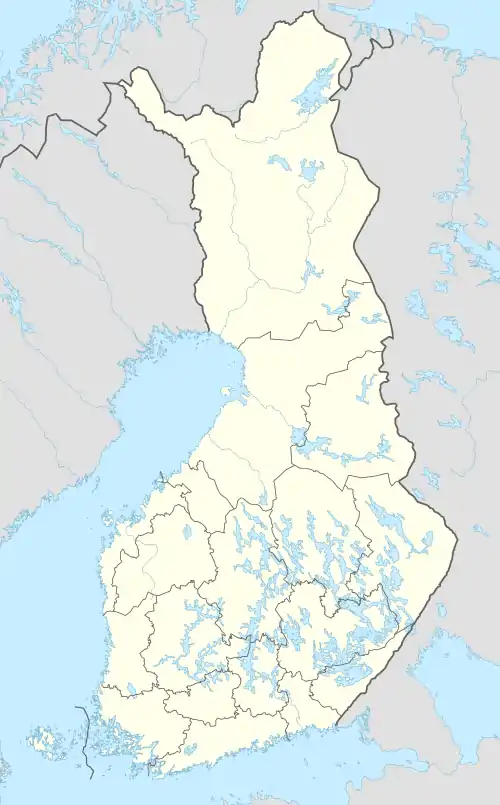2018 UEFA European Under-19 Championship
The 2018 UEFA European Under-19 Championship (also known as UEFA Under-19 Euro 2018) was the 17th edition of the UEFA European Under-19 Championship (67th edition if the Under-18 and Junior eras are included), the annual international youth football championship organised by UEFA for the men's under-19 national teams of Europe. Finland hosted the final tournament, between 16 and 29 July, after being selected by UEFA on 26 January 2015.[2] A total of eight teams competed in the tournament, with players born on or after 1 January 1999 eligible to participate.
| Jalkapallon alle 19-vuotiaiden Euroopan-mestaruuskilpailut 2018 (in Finnish) U19-Europamästerskapet i fotboll 2018 (in Swedish) | |
|---|---|
 | |
| Tournament details | |
| Host country | Finland |
| Dates | 16–29 July 2018 |
| Teams | 8 (from 1 confederation) |
| Venue(s) | 2 (in 2 host cities) |
| Final positions | |
| Champions | |
| Runners-up | |
| Tournament statistics | |
| Matches played | 16 |
| Goals scored | 58 (3.63 per match) |
| Top scorer(s) | (5 goals each)[1] |
Same as previous editions held in even-numbered years, the tournament acted as the UEFA qualifiers for the FIFA U-20 World Cup. The top five teams of the tournament qualified for the 2019 FIFA U-20 World Cup in Poland as the UEFA representatives, besides Poland who qualified automatically as hosts.
In the final, 2017 runners-up Portugal beat the 2016 losing finalists Italy 4–3, after extra-time, to win their first title in the under-19 era and their fourth overall.[3] Having won the Under-17 title in 2016, this generation of players became the first to hold the European title in both youth categories.[4] England were the defending champions, but were eliminated by France, finishing third in the group stage. They lost 0–3 to Norway in the play-off round and thus failed to qualify for the 2019 FIFA U-20 World Cup, where they would also defend their title.
Qualification
All 55 UEFA nations entered the competition (including Kosovo who entered for the first time), and with the hosts Finland qualifying automatically, the other 54 teams competed in the qualifying competition to determine the remaining seven spots in the final tournament.[5] The qualifying competition consisted of two rounds: Qualifying round, which took place in autumn 2017, and Elite round, which took place in spring 2018.[6]
Qualified teams
The following teams qualified for the final tournament.[7]
Note: All appearance statistics include only U-19 era (since 2002).
| Team | Method of qualification | Appearance | Last appearance | Previous best performance |
|---|---|---|---|---|
| Hosts | 1st | — | Debut | |
| Elite round Group 1 winners | 4th | 2005 (group stage) | Group stage (2002, 2003, 2005) | |
| Elite round Group 2 winners | 10th | 2017 (champions) | Champions (2017) | |
| Elite round Group 3 winners | 6th | 2016 (runners-up) | Champions (2003) | |
| Elite round Group 4 winners | 5th | 2015 (group stage) | Champions (2009) | |
| Elite round Group 5 winners | 10th | 2017 (runners-up) | Runners-up (2003, 2014, 2017) | |
| Elite round Group 6 winners | 10th | 2016 (champions) | Champions (2005, 2010, 2016) | |
| Elite round Group 7 winners | 6th | 2013 (group stage) | Runners-up (2004) |
Venues
The tournament took place in Vaasa and Seinäjoki.[9]
| Seinäjoki | Vaasa | |
|---|---|---|
| OmaSP Stadion | Hietalahti Stadium | |
| Capacity: 5,672 | Capacity: 5,572 | |
 |
 |
Match officials
A total of 6 referees, 8 assistant referees and 2 fourth officials were appointed for the final tournament.[7]
|
|
|
Squads
Each national team submitted a squad of 20 players (Regulations Article 39).[6]
Group stage
The final tournament schedule was confirmed on 5 June 2018.[10]
The group winners and runners-up advanced to the semi-finals and qualified for the 2019 FIFA U-20 World Cup. The third-placed teams entered the FIFA U-20 World Cup play-off.
- Tiebreakers
In the group stage, teams were ranked according to points (3 points for a win, 1 point for a draw, 0 points for a loss), and if tied on points, the following tiebreaking criteria were applied, in the order given, to determine the rankings (Regulations Articles 16.01 and 16.02):[6]
- Points in head-to-head matches among tied teams;
- Goal difference in head-to-head matches among tied teams;
- Goals scored in head-to-head matches among tied teams;
- If more than two teams were tied, and after applying all head-to-head criteria above, a subset of teams were still tied, all head-to-head criteria above were reapplied exclusively to this subset of teams;
- Goal difference in all group matches;
- Goals scored in all group matches;
- Penalty shoot-out if only two teams had the same number of points, and they met in the last round of the group and were tied after applying all criteria above (not used if more than two teams had the same number of points, or if their rankings were not relevant for qualification for the next stage);
- Disciplinary points (red card = 3 points, yellow card = 1 point, expulsion for two yellow cards in one match = 3 points);
- UEFA coefficient for the qualifying round draw;
- Drawing of lots.
All times were local, EEST (UTC+3).
Group A
| Pos | Team | Pld | W | D | L | GF | GA | GD | Pts | Qualification |
|---|---|---|---|---|---|---|---|---|---|---|
| 1 | 3 | 2 | 1 | 0 | 5 | 3 | +2 | 7 | Knockout stage and 2019 FIFA U-20 World Cup | |
| 2 | 3 | 2 | 0 | 1 | 8 | 4 | +4 | 6 | ||
| 3 | 3 | 1 | 1 | 1 | 5 | 6 | −1 | 4 | FIFA U-20 World Cup play-off | |
| 4 | 3 | 0 | 0 | 3 | 2 | 7 | −5 | 0 |
| Finland | 2–3 | |
|---|---|---|
| Report |
|
| Portugal | 3–0 | |
|---|---|---|
| Report |
Group B
| Pos | Team | Pld | W | D | L | GF | GA | GD | Pts | Qualification |
|---|---|---|---|---|---|---|---|---|---|---|
| 1 | 3 | 2 | 1 | 0 | 4 | 2 | +2 | 7 | Knockout stage and 2019 FIFA U-20 World Cup | |
| 2 | 3 | 2 | 0 | 1 | 11 | 2 | +9 | 6 | ||
| 3 | 3 | 1 | 1 | 1 | 4 | 8 | −4 | 4 | FIFA U-20 World Cup play-off | |
| 4 | 3 | 0 | 0 | 3 | 2 | 9 | −7 | 0 |
| Turkey | 2–3 | |
|---|---|---|
| Report |
| France | 1–2 | |
|---|---|---|
|
Report |
|
Knockout stage
In the knockout stage, extra time and penalty shoot-out were used to decide the winner if necessary.[6]
Bracket
| Semi-finals | Final | |||||
| 26 July – Vaasa | ||||||
| 2 | ||||||
| 29 July – Seinäjoki | ||||||
| 0 | ||||||
| 3 | ||||||
| 26 July – Vaasa | ||||||
| 4 | ||||||
| 0 | ||||||
| 5 | ||||||
| World Cup play-off | ||||||
| 26 July – Seinäjoki | ||||||
| 3 | ||||||
| 0 | ||||||
FIFA U-20 World Cup play-off
Winner qualified for 2019 FIFA U-20 World Cup.
Qualified teams for FIFA U-20 World Cup
The following six teams from UEFA qualify for the 2019 FIFA U-20 World Cup, including Poland which qualified as hosts.
| Team | Qualified on | Previous appearances in FIFA U-20 World Cup1 |
|---|---|---|
| 16 March 2018[11] | 4 (1979, 1981, 1983, 2007) | |
| 22 July 2018[12] | 6 (1977, 1981, 1987, 2005, 2009, 2017) | |
| 22 July 2018[12] | 11 (1979, 1989, 1991, 1993, 1995, 1999, 2007, 2011, 2013, 2015, 2017) | |
| 23 July 2018[13] | 3 (2001, 2005, 2015) | |
| 23 July 2018[13] | 6 (1977, 1997, 2001, 2011, 2013, 2017) | |
| 26 July 2018[14] | 2 (1989, 1993) |
- 1 Bold indicates champions for that year. Italic indicates hosts for that year.
Goalscorers
There were 58 goals scored in 16 matches, for an average of 3.62 goals per match.
5 goals
4 goals
2 goals
1 goal
 Ben Brereton
Ben Brereton Elliot Embleton
Elliot Embleton Japhet Tanganga
Japhet Tanganga Marcus Tavernier
Marcus Tavernier Eetu Vertainen
Eetu Vertainen Saku Ylätupa
Saku Ylätupa Michaël Cuisance
Michaël Cuisance Moussa Diaby
Moussa Diaby Myziane Maolida
Myziane Maolida Davide Frattesi
Davide Frattesi Nicolò Zaniolo
Nicolò Zaniolo Christian Borchgrevink
Christian Borchgrevink Erling Haaland
Erling Haaland Mésaque Djú
Mésaque Djú José Gomes
José Gomes Domingos Quina
Domingos Quina Metehan Güçlü
Metehan Güçlü Güven Yalçın
Güven Yalçın Vladyslav Supriaha
Vladyslav Supriaha Heorhiy Tsitaishvili
Heorhiy Tsitaishvili
Source: UEFA.com[15]
Team of the Tournament
The UEFA technical observers selected the following 11 players for the team of the tournament (and an additional nine substitutes):[16]
|
Starting XI:
|
Substitutes:
|
References
- Woloszyn, Paul (29 July 2018). "Portugal pair share U19 EURO top scorers' prize". UEFA.com. Retrieved 30 July 2018.
- "Georgia and Finland to stage U19 EURO". UEFA.com. 26 January 2015.
- "All the Under-19 EURO results". UEFA.com. 29 July 2018.
- "Under-19 - Italy-Portugal". UEFA.com. 29 July 2018. Retrieved 31 July 2018.
- "Seedings for 2017/18 U19 qualifying round". UEFA. 24 November 2016.
- "Regulations of the UEFA European Under-19 Championship, 2017/18" (PDF). UEFA.com.
- "UEFA European Under-19 Championship Finland 2018". UEFA Programmes.
- "Under-19 final tournament draw". UEFA.com.
- "THE TOURNAMENT WILL BE PLAYED IN TWO VENUES, IN VAASA AND SEINÄJOKI". www.uefa.com.
- "#U19EURO finals schedule confirmed". UEFA.com. 5 June 2018.
- "FIFA Council decides on key steps for the future of international competitions". FIFA.com. 16 March 2018.
- "Italy, Portugal heading to U-20 World Cup". FIFA.com. 22 July 2018.
- "Ukraine and France qualify for Poland 2019". FIFA.com. 23 July 2018.
- "Norway book Europe's last spot, holders England eliminated". FIFA.com. 26 July 2018.
- "Statistics — Tournament phase — Player statistics — Goals". UEFA.com. Retrieved 29 July 2018.
- "Under-19 EURO team of the tournament". UEFA.com. 1 August 2018.
External links
| Wikimedia Commons has media related to 2018 UEFA European Under-19 Championship. |
